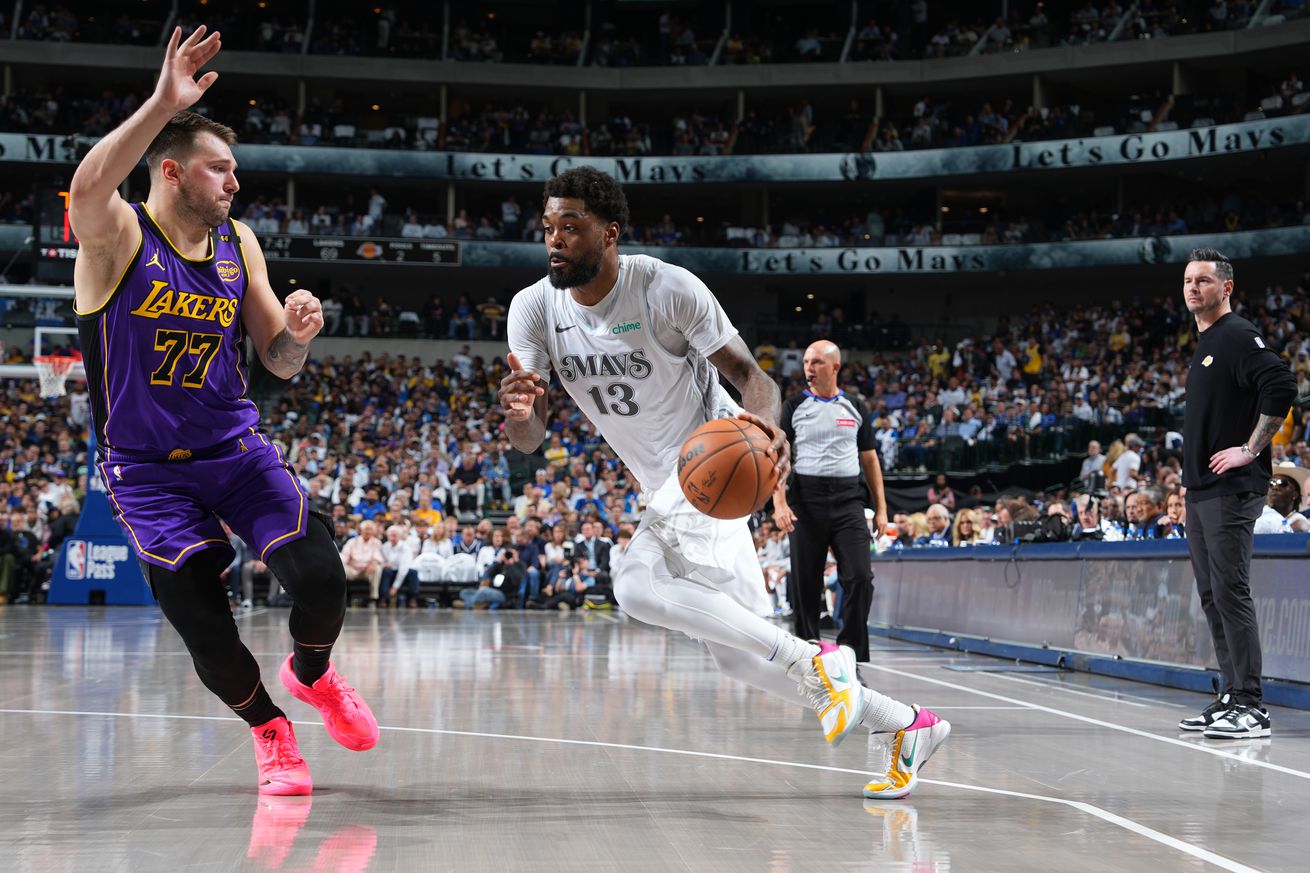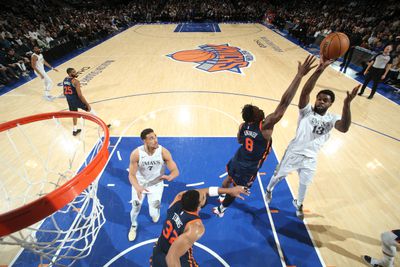
Marshall made good on the expectations in Year One with Dallas, and then some. But, oh, what more could have been?
Naji Marshall was one of those additions to the Dallas Mavericks roster coming into the 2024-25 season that had fans licking their chops. After shooting a career-best 38.5% from 3-point range in his last year with the New Orleans Hornets, he had the making of a true 3-and-D wing. He’s big, he’s strong, he’s long and he’s got just enough of a mean streak to stand up for his teammates without becoming a bully.
Marshall is exactly the kind of guy you’d bring in expecting to get an offensive bump from your generationally talented offensive behemoth who creates more shots for his teammates than anyone else in the NBA. He’s also exactly the kind of guy you’d bring in to help mask some of that generationally talented offensive behemoth’s shortcomings on the defensive end. He was a near-perfect addition to a Luka-Dončić-led team.
Yea, about that…
What Mavericks fans found out along the way was that Marshall’s game doesn’t just fit his well-earned nickname, “The Knife.” It’s got all sorts of handy attachments and secret compartments you may not have even known about when you bought the thing. Marshall proved to be the Mavs’ Swiss Army Knife, especially after Dončić was dealt to the Los Angeles Lakers for Anthony Davis, Max Christie and a handful of pocket lint on Feb. 1, and especially again in March, when the rest of the roster dropped like flies due to a cosmic bout of injury trouble.
Season in review
Marshall’s month of March was so huge, you may not fully remember the very solid November he put together first. After a rocky start in the season’s first six games getting acclimated to his new team, his first 20-point performance in a Mavericks uniform came on Nov. 4, when he came off the bench and shot 8-of-9 from the field, including 2-of-2 from 3-point range, in a 134-127 home loss to the Indiana Pacers. His 3-point shooting was the one facet of his game that let him down a little for much of the season, as he ended the year shooting an abysmal 27.5% from deep. That number is more than 10 percentage points down from the previous year.
He would later score 18 in a 114-113 loss to the Phoenix Suns and 19 in a 115-113 loss at the Utah Jazz, all while being assigned to the opposing team’s best offensive option during his minutes on the floor. Then Marshall kicked it into overdrive, scoring 20 or more in four straight games from Nov. 22-27, including wins at the Denver Nuggets and against the New York Knicks. For a guy whose previous high-scoring average for a season was 9.1 points per game, he seemed to be settling into a good spot here in Dallas. He averaged 14.3 points on a more respectable 34.5% from 3-point land in November. December and January were much quieter months, as he missed some time due to illness, and he didn’t finish February with a bang, either.
Then there was March, when Marshall was oftentimes the team’s last offensive option left standing in the wake of injuries to Anthony Davis, Kyrie Irving, Daniel Gafford, Dereck Lively II and at other times, PJ Washington. Marshall and Spencer Dinwiddie shouldered much of the scoring burden in some games that were tough to watch at times, but they kept the Mavs afloat in the Western Conference playoff conversation, at least.
Marshall averaged 19.8 points, 7.3 rebounds and 3.5 assists per game as his role increased out of necessity down the stretch. But he proved he could do it on both ends of the floor, and he proved he was becoming a team leader, much like the role Washington grew into just ahead of Marshall. He was willing to do the dirtiest work at a very dirty time to get the job done. He became a fan favorite at a time when many Mavericks fans lost the ability to feel real human emotions any longer. There is a special corner in basketball heaven reserved for guys like Marshall.
Though his 3-point shot left him for long stretches, he developed a lethal driving floater. Defenders couldn’t deal with Marshall’s combined strength through the shoulders and the 7’1” wingspan on his 6’7” frame when he decided it was time to get to the bucket. It was almost like at some point Marshall decided that, hey, if the 3-ball isn’t falling, you’ve got to go get it another way. It’s resourceful and shows off the adaptability of his game.
Just look at the stats. March, his best offensive month of the season by far, was the same month that Marshall’s 3-point shooting sank to a season-low (to that point — it would actually get worse in April) 23.7%. That same month, he shot 53.7% from the field overall, a mark he only beat in November (58.0%). He simply found a way to get it done.
Marshall surpassed his (then) career-high scoring mark and nearly filled out his first-ever triple-double in the same game, a 125-116 loss to the Phoenix Suns on Mar. 9. He finished with 34 points, 10 assists and nine rebounds just one game after going for 29 and 17 in a home loss to the Memphis Grizzlies.
Best game

Photo by Nathaniel S. Butler/NBAE via Getty Images
Marshall set new career-high scoring marks four different times this season, starting with a dazzling 26-point performance in a 123-120 win at the Nuggets on Nov. 22. That 34-point eruption in March only stood as a career-high for 16 days before Marshall looked destined for a 40-piece against the Knicks on Mar. 25. He couldn’t lift the Mavs to a win all by his lonesome that night, but he was the best player on the Madison Square Garden court.
He was everywhere against the Knicks that night, shooting 17-of-25 from the field and finishing the game without a single turnover in 38 minutes.
Contract status
Marshall signed a three-year, $27-million contract with the Mavericks last offseason. He came in as the Derrick Jones Jr. replacement at small forward but is a much more imposing physical presence and proved to be much better than the outgoing DJJ on the offensive end. It looks like a steal in retrospect, and the deal will have Marshall in a Mavericks uniform for the next two seasons. He’ll become an unrestricted free agent in 2027.
Looking ahead
Will Marshall’s 3-point shot return to him in his second year with the Mavericks, or was his 38.5% mark in 2023-24 the aberration? Even regressing to his own career mark of around 30% would be an improvement from his first year in Dallas.
Otherwise, you’d have to squint pretty hard to find any glaring flaws in Marshall’s game. With Kyrie Irving on the shelf with a reconstructed ACL for a good chunk of the upcoming season, the Mavs may continue to look to Marshall (as well as Washington) to provide some significant scoring punch, to go along with his well-established bonafides on the defensive end. At age 27, he’s in his prime, but that doesn’t mean he can’t get better at one or two things.
Grade: A-
Marshall set new career-best averages in scoring (13.2 points per game) and rebounding (4.8) in his first year with the Mavericks, and he didn’t have to sacrifice any of the hard work on the defensive end he’s become known for to get there. Though his 3-point shooting let him down, especially to start the season, that’s something that an offseason spent in the gym can address. He’s effective, efficient, adaptable and brings a ton of heart to the Mavs lineup. Lord knows they need a heaping helping of that.